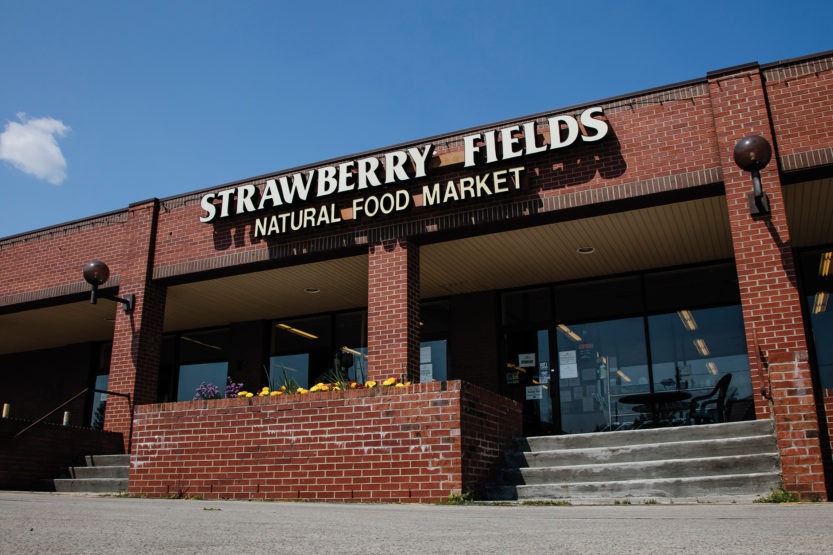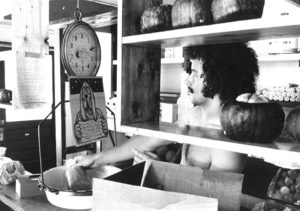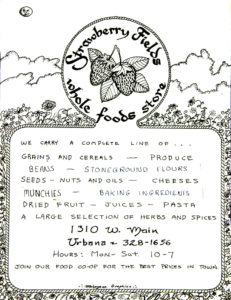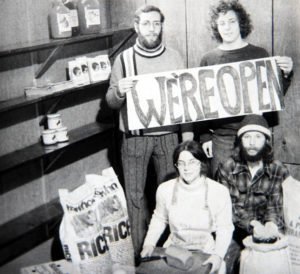Memory Lane: Strawberry Fields … forever
 Strawberry Fields Natural Food Market in Urbana has gone through many incarnations since it first opened back in 1975. Then, the whole food store sold ingredients in bulk, offered six types of homemade granola and even had an onsite flour mill. (Photo by L. Brian Stauffer)
Strawberry Fields Natural Food Market in Urbana has gone through many incarnations since it first opened back in 1975. Then, the whole food store sold ingredients in bulk, offered six types of homemade granola and even had an onsite flour mill. (Photo by L. Brian Stauffer) It all began in Middle Earth, not too far from where the Beckman Institute and the Coordinated Science Laboratory now stand on the engineering side of the University of Illinois campus.
Maps from the late 1960s and early ’70s labeled that part of campus “Middle Earth” in honor of author J.R.R. Tolkien’s fantasyland. But in the ’70s, the area was mostly populated by hippies, not hobbits. It’s also where Strawberry Fields, the first whole food store in Urbana-Champaign took root.
“I remember my dog, Harold, sitting out on the front porch of the store and my son, Eli, covered in watermelon, from head to foot,” says Lester Karplus, ’74 LAS, who turned Strawberry Fields into a retail store in 1975. “It was a throwback in some sense to earlier times, with everything being truly whole food.”
In those days, the store was located at the corner of Main and Romine—“on two dead-end streets, in back of an unsightly old building,” Karplus says.
Despite its less-than-ideal location, Strawberry Fields became a local institution that has sustained itself to this day, currently located in a proper brick building in Urbana.
But to understand how Strawberry Fields began, you have to go back to 1970, when that “unsightly old building” was first converted into a meeting place for the count-erculture community. Victor Fein and the late Bill Goran, ’69 LAS, MS ’76 LAS, MEXED ’83 ACES, formed a group of craft businesses called Earthworks; Fein then opened the Metamorphosis restaurant in the same large warehouse.
“It was a space to gather and exchange ideas,” says Fein, who still lives in Urbana. The alternative businesses were run as collectives, with employees sharing in the decision-making process and profits (what little there were).
Earthworks went on to include the bulk-food store Earthfoods, the forerunner to Strawberry Fields. When Earthfoods closed in 1974, Strawberry Fields rose up in its place, initially run as a “quasi food co-op” by three students, Karplus explains. People placed food orders on Wednesdays and picked them up on Saturdays.
When Metamorphosis closed, Karplus stepped in, renaming it Butterbur’s, after the owner of the Middle Earth Inn from the Tolkien novel The Lord of the Rings. A year later, in 1975, Karplus and his then-wife, Debra Doppelt Karplus, MS ’97 AHS, ’75 UIC, merged the restaurant with Strawberry Fields, changing the co-op into a retail bulk-food store.
“We took my old station wagon and an old van, and rumbled up to Chicago to pick up our first food order” for the business, Karplus recalls.
It was a wild ride trying to operate both the restaurant and the store with sporadic volunteer workers and malfunctioning equipment, he adds. Karplus eventually decided to shutter the restaurant, expand the store and stabilize finances by charging a $10 one-time membership fee. A major lure of the business proved to be its natural food offerings. “We were pretty much self-funded once we got to 3,000 members,” he says.
Strawberry Fields packed its own oils and sweeteners. It also made its own peanut butter, six types of granola, cookies, rolls and several kinds of bread. The store even had an on-site flour mill and started the first glass recycling initiative in the area. In addition, Karplus created a wholesale food company, Corn Country.
When the business “became more than the store could manage,” he sold Strawberry Fields to Jon and Sally Quinn in 1979. It has since been passed on to several owners, including Mohammad Al-Heeti, PHD ’87 ACES, its current proprietor.
Strawberry Fields began “as a personal vendetta against the food establishment,” putting people first and profits last, Karplus says. “The food establishment tried to prove that it couldn’t be done. But our own success story is being repeated every day all across the country.”




